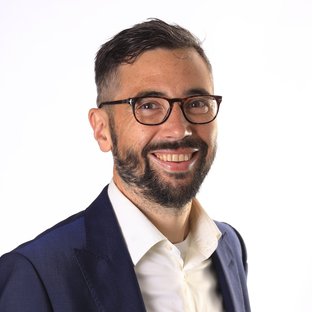
Professor Nicholas K. Jones PhD
Biography
Before joining St John’s in October 2020, I was at the University of Birmingham for seven years as a Birmingham Fellow and then Reader in Philosophy. I was also previously a Fitzjames Research Fellow at Merton College, Oxford following a Jacobsen Fellowship at King's College London and the Institute of Philosophy. I studied for a PhD at Birkbeck, University of London with Dorothy Edgington and Fraser MacBride and hold a BA and MA in philosophy from the University of Leeds. I’m originally from North Derbyshire and I love running up hills.
Teaching
I give tutorials throughout theoretical philosophy for students at St John’s. To date, that includes Introduction to Logic and General Philosophy for Prelims; Knowledge & Reality and Philosophy of Religion for Finals.
I vividly recall the logic lectures right at the start of my first year as an undergraduate. Like all first-year philosophers, we learned how to formalise arguments from English, before using truth-tables and natural deduction to check them for validity. I’d never seen anything like it. It seemed to me almost like magic, how these weird symbols could be used to reveal something so deep about something so familiar. That feeling’s never left me; perhaps my favourite philosophical genre turns on the conflicts and tensions that arise from regimenting familiar phenomena with the precision of formal logic. I love being a custodian of this knowledge and helping new philosophy students experience the magic for themselves.
Research Interests
My research lies at the intersection of metaphysics with philosophy of language and philosophy of logic. I’m especially interested in objecthood and identity, as well as in understanding the influence and limits of the formal tools used to formulate metaphysical theories. Much of my current research involves higher-order languages. These are formal languages that use new devices of generalisation to extend the languages taught in introductory logic and widely employed throughout metaphysics. I like to ask metaphysical questions about higher-order languages and to apply those languages within mainstream analytic metaphysics. I’m interested in higher-order languages in part because they allow us to express highly general questions about reality’s structure directly, whereas more orthodox languages are restricted to questions about surrogates or proxies for that structure. Another nice feature of higher-order languages is that we can use them to reformulate some long-standing metaphysical debates – for example, about the nature of properties, relations, propositions, facts, and possibility – in a way that delivers a fruitful new perspective on old, intractable problems.
What inspired me?
With the benefit of hindsight, I guess I’ve always been interested in slightly weird, abstract questions we don’t seem to know how to address, or that don’t obviously make sense, or that just feel a bit intangible, ephemeral, or otherwise hard to express. It turns out that philosophy is full of such questions. I was lucky at school to have a physics teacher who encouraged my interests and pointed me in the right direction. That led me to study philosophy as an undergraduate and I was hooked straight away.
Awards and distinctions
Winner of the Sanders Prize for Metaphysics, 2012.
AHRC Leadership Fellowship on 'Higher-Order Metaphysics', 2017–19.
Executive Committee of the Aristotelian Society, 2017–21.
Visiting Fellow at ConceptLab, Oslo, 2018.
Managing Editor for Ergo: An Open Access Journal of Philosophy, 2019–ongoing.
Selected publications
‘Unrestricted quantification and the structure of type theory’ in Philosophy and Phenomenological Research. Published online August 2019. Co-authored with Salvatore Florio. Published (open access).
‘The proper treatment of identity in dialetheic metaphysics’ in The Philosophical Quarterly (2020) 70: 278: 65–92. Archived (open access). Published.
‘Propositions and cognitive relations’ in Proceedings of the Aristotelian Society (2019) 2: 119: 157–178 Archived (open access). Published. Audio podcast: download, iTunes.
‘How to unify’ in Ergo: An Open Access Journal of Philosophy (2018) 5: 31: 816–842. Published (open access).
“Nominalist realism” in Noûs (2018) 52: 4: 808–835. Archived (open access). Published.